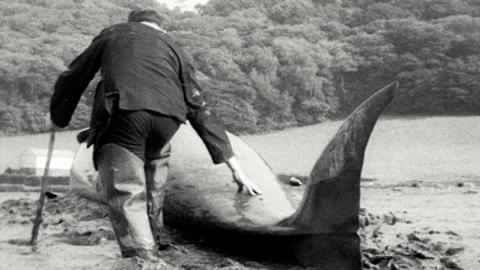The Box is a major cultural and heritage attraction and archive, which opened in Plymouth’s city centre in September 2020. Its collection, formally the South West Film and Television Archive (SWFTA), is the regional film archive for the South West of England, comprising the combined programme libraries of Westward Television and Television South West (TSW). It also includes a significant number of donated film collections dating back to the early 1890s.
This film is part of Free

Whale in the Tamar
Whale stranded on the banks of the Tamar
In partnership with:

Overview
Cetacean stranding is a common occurrence. Cetacea means large sea creature in Latin or sea monster in Greek, in this case a whale finds its way up the Tamar as far as the Lynher or St German’s River and the change in tide leaves it stranded. Whales are marine mammals but many can survive in freshwater. Reasons given for beaching may include disturbance from active military sonar.
This whale may have become stranded posthumously but some also die from dehydration or from internal organs being crushed under their own weight and others may even die from drowning if the rising tide covers the blowhole. The Natural History Museum has been recording stranded or beached cetaceans since 1913. In 1988 an outbreak of the phocine distemper virus caused the deaths of thousands of seals, which prompted a long standing programme to record the information on all cetaceans stranded or found dead around the UK. In 2000 several groups amalgamated into the UK Cetacean Strandings' Investigation Programme (CSIP).
Related

Wisdom of the Wild Wisdom of the Wild
Documentary 1940 12 mins
Fun mixture of natural history and wartime public information.

Dog Years Dog Years
Comedy 2004 4 mins
Sweet and funny short about a potty-mouthed dog who loves his owner

Beetle Racing Beetle Racing
News 1959 3 mins
Six legged competitors take to the starting blocks as a Midlands pub brings the sport of beetle racing to the world.

Alligator on Lizard Alligator on Lizard
Current affairs 1971 5 mins Location: St Keverne
Daisy the pet alligator living on the Lizard in Cornwall

Anoop and the Elephant Anoop and the Elephant
Children's 1972 52 mins Director: David Eady
Fun-packed comedy for kids, in which a boy befriends a baby elephant – then teams up with his friends to stop it being sold

Open Your Eyes Open Your Eyes
Amateur film 1967 14 mins Location: Thompson Common
Should you look hard enough, you’ll be amazed at the antics that creatures get up to, says Dorothy Maxey, amateur filmmaker and naturalist.

Layla - Exclusive Q&A Layla - Exclusive Q&A
Short interview 2025 27 mins
Writer, director and performer Amrou Al-Kadhi talks to Rico Johnson-Sinclair about their debut feature.

All We Imagine As Light - Exclusive Q&A All We Imagine As Light - Exclusive Q&A
Short interview 2025 28 mins
Payal Kapadia discusses her Cannes prize-winning and Bafta-nominated drama with Ashanti Omkar.

Khichdi Khichdi
Animation & Artists Moving Image 2023 16 mins
The interwoven stories of four best friends who reunite in the UK, thirty-five years after training together as nurses during their teens in Ferozepur, Punjab.

Dr XYZ: A Medical Drag Transthology Dr XYZ: A Medical Drag Transthology
Documentary 2023 15 mins
A satirical take on the healthcare service announcements of the 1960s and 70s.

Every Moment Counts Every Moment Counts
Animation & Artists Moving Image 2023 9 mins
A short animation that offers a window into the world of children’s palliative care.

Police Story: Panel Discussion Police Story: Panel Discussion
Inside Film 2024 24 mins
Panel discussion on Jackie Chan's 1985 action classic Police Story, with Chase Armitage, Sam Mak and Jadey Duffield.